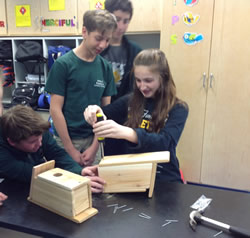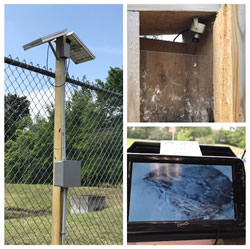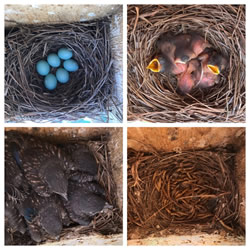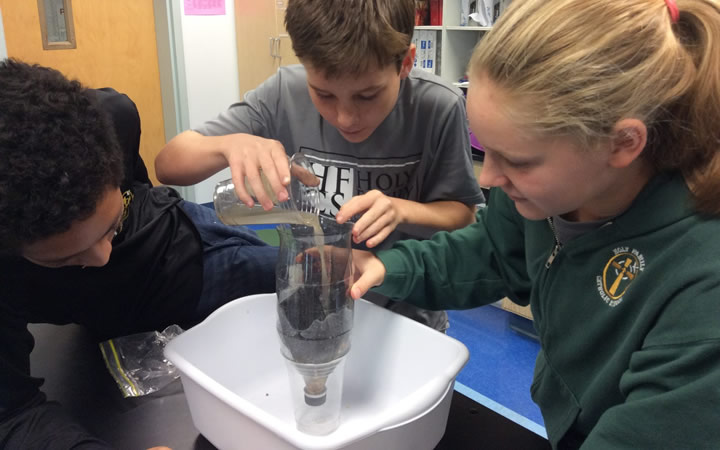Finding Authentic STEM Contexts in Our Own Backyard
Yanny Salom, Trustey Fellows Cohort 2 - Holy Family Catholic School in Jacksonville, FL
All human activities have short and long-term consequences for ecosystems. The ethical considerations those consequences raise become an opportunity for our students to consider the impact of their decisions and their solutions. Highly effective STEM education helps students recognize the multiplicity of solutions while weighing the implications for people and the environment.
Especially in light of Pope Francis’ encyclical letter about taking care of the Earth, Laudato si’, STEM education has an important place in Catholic education. It gives teachers the opportunity to teach ethics as our classrooms become spaces with a meaningful civic purpose that allow us to educate the whole child about the natural and material world around them.
At Holy Family Catholic School, we are on a quest to practice conservation as a foundation of environmental protection. We are blessed that our school’s location in Jacksonville, Florida, gives our students opportunities for both studying and developing conservation solutions.
 Start with Awareness
Start with Awareness
We raise questions in our classrooms and find evidence to address and contextualize environmental problems to practice conservation and produce empathetic citizens who persist in the face of adversity. For the last two years, we have built and monitored bluebird houses. We have also created awareness surrounding the survival of Florida sea turtles; students wrote letters to a Florida senator to encourage him to support efforts to ensure their survival.
This year we will address another local problem: the rising death rate of our Florida manatees. We know human activities such as boating present dangers to this herbivorous mammal. After completing our unit on waves, our eighth-grade classes will do a STEM analysis on the effect of boats on manatees’ population and provide solutions to reduce the risk of manatees being killed or hurt by boats. Boats seem to be the leading cause of death of this marine animal and the unit on waves will give students the scientific knowledge to consider effective alerting devices to deliver solutions.
Integrate Engineering to find Solutions
 To alleviate the impact of human deforestation, students designed and built birdhouses for our local Eastern bluebirds. Constructing houses for these nesting birds and monitoring their nesting habitats have contributed to the birds’ survival. Students also created habitats for monarch butterflies so that they could find a safe place to raise their young on our school campus. To address the problem of Florida sea turtles, students engineered filtration systems to reduce industrial pollutants discharged to the ocean.
To alleviate the impact of human deforestation, students designed and built birdhouses for our local Eastern bluebirds. Constructing houses for these nesting birds and monitoring their nesting habitats have contributed to the birds’ survival. Students also created habitats for monarch butterflies so that they could find a safe place to raise their young on our school campus. To address the problem of Florida sea turtles, students engineered filtration systems to reduce industrial pollutants discharged to the ocean.
Our eighth-grade students also worked to solve environmental problems in their projects for the science and engineering fair. Their ideas ranged from charging cell phones by converting energy from living plants into electrical energy to engineering an eco-friendly bioplastic to use in utensils that would be biodegradable. Our goal is to implement a school-wide conservation plan and create awareness of the value of conservation as the foundation of environmental protection.
STEM as a Force for Good
 These conservation initiatives have been designed to foster collaboration, critical thinking skills, and communication while working through the Engineering Design Process with evidence-based data that allow students to generate designs and see the value of multiple solutions. Our students are living out the Catholic Social Teaching "Care for God's Creation" as they reflect on their roles as stewards of the environment. They are positioned as problem solvers while they learn the practical value of scientific knowledge and consider the world of engineering as a possible career path.
These conservation initiatives have been designed to foster collaboration, critical thinking skills, and communication while working through the Engineering Design Process with evidence-based data that allow students to generate designs and see the value of multiple solutions. Our students are living out the Catholic Social Teaching "Care for God's Creation" as they reflect on their roles as stewards of the environment. They are positioned as problem solvers while they learn the practical value of scientific knowledge and consider the world of engineering as a possible career path.
At Holy Family, students want to be part of the solution rather than part of the problem. This initiative to create awareness is based on what humans can do to practice conservation as they deepen their sense of respect and reverence for God’s creation and understand their roles as stewards of the natural world.
Interested in learning more? Sign up for Yanny’s webinar - Conservation in the Classroom: Sheltering and Monitoring Bluebirds - on March 27 at 7:00pm EST



